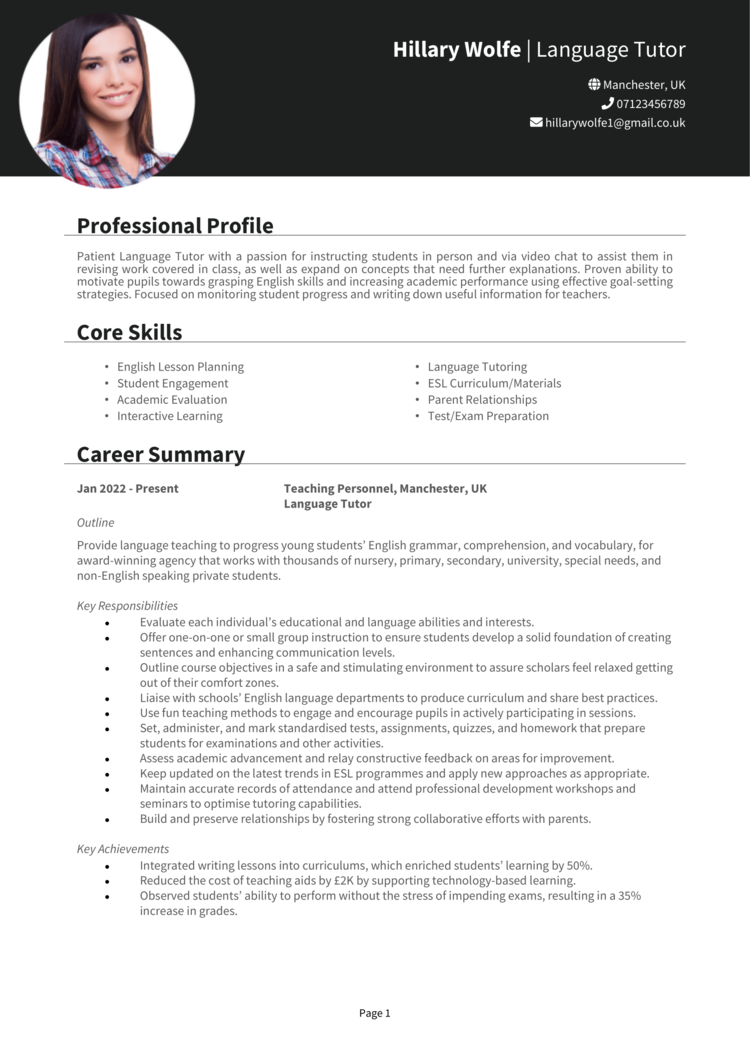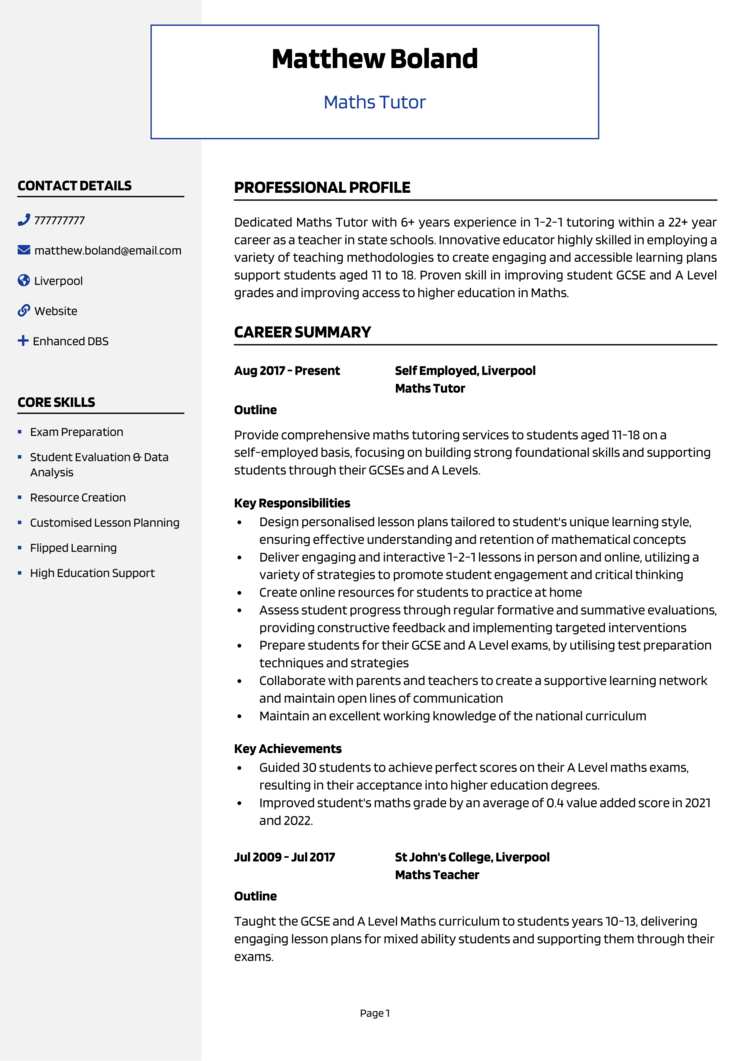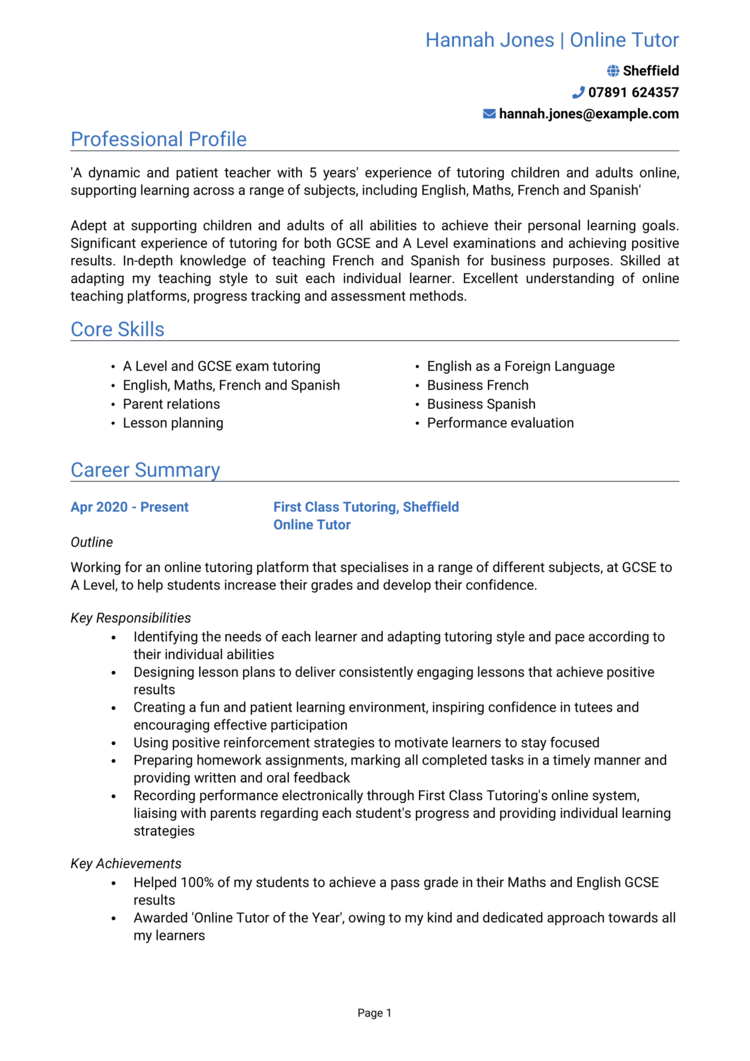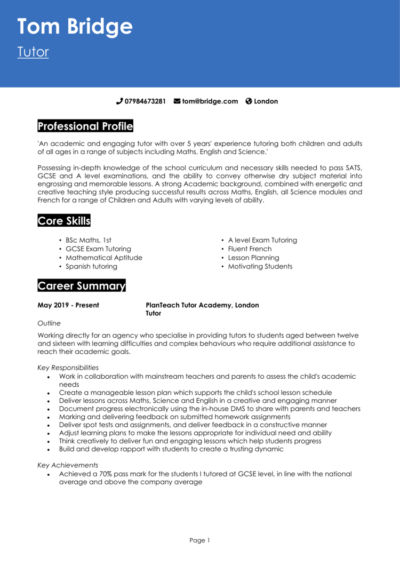Tutoring is as much about inspiration as it is about instruction. But whether you’re helping students grasp algebra or guiding them through Shakespearean sonnets, your CV needs to be as engaging as your lessons.
This guide and its Tutor CV examples will help you craft a CV that highlights your subject expertise and ability to help students succeed – so you can land the tutoring role you’re aiming for.
Tutor CV example

Language Tutor CV example

Maths Tutor CV example

Online Tutor CV example

How to write your Tutor CV
Learn how to create your own interview-winning Tutor CV with this simple step-by-step guide.
Think of writing a CV as your written classroom introduction – if it doesn’t grab attention, recruiters might zone out faster than a student in a 9am lecture.
In this guide, you’ll learn how to present your teaching experience effectively and showcase your ability to help students improve their grades and confidence. By the end, your application will be as well-structured as a top-scoring essay.
Tutor CV structure


Recruiters, parents, and tutoring agencies want to find the most important details quickly, so keeping your CV well-organised is key.
Recruiters aren’t looking for a research paper; they want a clear, concise breakdown of why you’re the best tutor for the job: your structure should effectively guide them through these details.
Here’s the layout you should follow:
- Name and contact details – Clearly display your contact details at the top so you can be easily contacted – you can optionally add a photo of yourself.
- Profile – Draw in the recruiter with a summary that highlights your tutoring expertise, teaching methods, and subject knowledge.
- Core skills – Focus on core skills like lesson planning, adapting teaching styles, and student engagement.
- Work experience – Walk through your professional experience, beginning with your latest position and moving backwards.
- Education – Outline your education and certifications, focusing on those most relevant to the role.
- Additional info – This section is optional, but it’s a good place for things like hobbies and awards that complement your professional profile.
How to format your Tutor CV


In the field of education, clarity is essential. A well-organised CV format ensures hiring managers can quickly see your credentials and experience. Make sure your CV is free from visual mistakes with the following simple tips.
Follow these formatting guidelines:
- Bullet points – Use them to break down tasks and achievements into easy-to-scan details.
- Divide sections – Use clear headings to make navigation simple for busy recruiters.
- Use a clear and readable font – Along with an appropriate colour scheme, ensure your font is easy for the recruiter to read
- No more than 2 pages – Stick to a two-page length limit to highlight your key achievements without unnecessary extras.
Tutor CV profile


The CV profile is your chance to introduce yourself as an effective and engaging tutor. Think of it as the opening paragraph of an essay – it needs to hook the reader immediately and motivate them to read more. By the end, recruiters should be convinced of the value you’d bring if you were hired.
Tutor CV profile examples
Profile 1
Dedicated Tutor with four years of experience providing personalised academic support in mathematics and science. Skilled in creating engaging lesson plans, adapting teaching methods to suit different learning styles, and tracking student progress. Proficient in online learning platforms such as Zoom, Google Classroom, and Kahoot. Passionate about helping students build confidence and achieve their academic goals.
Profile 2
Experienced English Tutor with three years of expertise in teaching literature, writing, and language skills to secondary school students. Adept at preparing students for exams, improving reading comprehension, and enhancing essay-writing abilities. Skilled in one-on-one tutoring and group instruction, using interactive learning methods to engage students. Committed to fostering a love for learning and academic excellence.
Profile 3
Patient and results-driven Tutor with over five years of experience providing private tutoring in GCSE and A-Level subjects. Skilled in breaking down complex concepts, designing customised study plans, and preparing students for exams. Proficient in using digital tools such as Microsoft Teams, Quizlet, and Whiteboard.fi to facilitate remote and in-person learning. Passionate about guiding students toward academic success.
What to include in your Tutor CV profile
Make sure to include:
- Subject expertise – Whether you specialise in maths, English, science, or multiple subjects, make it clear.
- Teaching experience – Mention how long you’ve been tutoring and whether it’s been in schools, online, or privately.
- Student success stories – If your students have achieved better grades or gained confidence in their studies, highlight it.
- Teaching approach – Do you tailor lessons to individual learning styles? Are you skilled in breaking down complex concepts?
- Technology and resources – If you use online tools, interactive materials, or exam prep strategies, mention them.
Core skills section


A core CV skills section gives hiring managers a quick way to assess your expertise. Since tutoring requires a mix of subject knowledge and teaching skills, tailor this section to the role you’re applying for.
If the role is focused on exam preparation, highlight curriculum knowledge and study techniques. If it’s one-on-one tutoring, emphasise adaptability and personalised lesson planning.
Essential skills that recruiters look for in a Tutor CV
- Lesson Planning and Preparation – Designing structured lessons tailored to students’ learning objectives and skill levels.
- Subject Matter Expertise – Providing in-depth knowledge and clear explanations in specific academic subjects.
- One-on-One Instruction – Customising teaching methods to suit individual student needs and learning styles.
- Assessment and Progress Tracking – Evaluating student performance through quizzes, assignments, and feedback sessions.
- Exam Preparation and Study Techniques – Coaching students on effective study habits, test strategies, and time management.
- Curriculum Adaptation – Adjusting teaching materials to align with school syllabuses, exam boards, or personal learning goals.
- Educational Technology Integration – Using digital tools, interactive software, and online platforms to enhance learning.
- Motivation and Engagement Strategies – Encouraging students through positive reinforcement and goal-setting techniques.
- Homework and Assignment Assistance – Supporting students with challenging tasks and reinforcing key concepts.
- Parental Communication – Providing feedback to parents or guardians on student progress and areas for improvement.
Work experience section


Tutoring isn’t just about what you teach – it’s about how you engage students and help them improve. Your work experience should highlight not just your responsibilities but also the results you’ve achieved.
List your roles in reverse chronological order, keeping each entry structured with bullet points. If you’re new to tutoring, include relevant experience such as mentoring, teaching placements, or working with students in other capacities.
How to structure jobs

- Outline – Introduce the setting, whether it’s private tutoring, a school, or an online platform.
- Responsibilities – List key tasks, such as designing lesson plans, assessing student progress, and providing feedback. Use action words like “taught”, “mentored”, and “developed”.
- Achievements – Showcase measurable success, such as students improving grades, passing exams, or gaining confidence in their studies.
Sample work experience for a Tutor
Maths Tutor | BrightFuture Learning
Outline
Provided one-on-one and group tutoring sessions in mathematics, helping students improve their problem-solving skills and exam performance.
Responsibilities
- Developed customised lesson plans tailored to each student’s learning needs and goals.
- Explained complex mathematical concepts in a simplified and engaging manner.
- Prepared students for GCSE and A-Level exams, focusing on past paper practice.
- Used interactive tools like Desmos and GeoGebra to make learning more engaging.
- Tracked student progress and provided regular feedback to students and parents.
Achievements
- Helped students improve their maths grades by an average of two letter grades.
- Developed a targeted revision programme that increased exam pass rates by 25 percent.
- Recognised for making challenging topics more accessible through clear and engaging explanations.
Private Tutor | Elevate Learning Academy
Outline
Delivered English tutoring sessions to students, focusing on improving reading, writing, and comprehension skills.
Responsibilities
- Designed engaging lessons covering grammar, creative writing, and literature analysis.
- Assisted students in developing strong essay-writing techniques and critical thinking skills.
- Prepared students for national exams, including GCSE English Language and Literature.
- Provided constructive feedback on written assignments to enhance writing clarity and structure.
- Encouraged students to engage in discussions and debates to improve confidence in speaking.
Achievements
- Increased students’ essay scores by an average of 20 percent through structured writing techniques.
- Boosted student confidence in public speaking through debate and presentation practice.
- Recognised by parents and students for delivering engaging and effective lessons.
Tutor | Self-Employed
Outline
Provided personalised tutoring sessions in science subjects for secondary and A-Level students, helping them improve understanding and exam performance.
Responsibilities
- Tailored lesson plans to address students’ weaknesses and reinforce key scientific concepts.
- Used online resources and virtual simulations to enhance interactive learning.
- Assisted students with homework, coursework, and exam revision strategies.
- Developed step-by-step problem-solving techniques to help students grasp difficult topics.
- Monitored student progress and adjusted teaching methods accordingly.
Achievements
- Achieved a 95 percent student success rate in exams, with many exceeding predicted grades.
- Expanded client base through referrals due to consistent student improvement.
- Received excellent feedback for patience, clarity, and effective teaching strategies.
Education section


Tutoring requires a strong academic background, so make sure your past education is clearly listed. If you have a degree in your subject area or a teaching qualification, include it prominently. While this section is vital, it should still be relatively brief, as your practical experience is more valued.
If you’ve completed additional training in pedagogy, child psychology, or exam preparation techniques, list them here to strengthen your application.
Qualifications recruiters look for in a Tutor CV
- Degree in a relevant subject (e.g., Maths, English, Science, Education) – A strong foundation in the subject you teach.
- PGCE (Postgraduate Certificate in Education) – Ideal for tutors with formal teaching experience.
- TEFL/TESOL Certification – Valuable for English tutors working with non-native speakers.
- Level 3 Award in Education and Training – A recognised teaching qualification for private tutors.
- Safeguarding and Child Protection Training – Important for tutors working with younger students.





